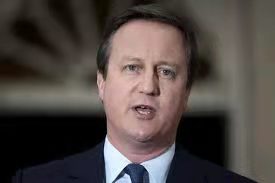



第4节
Britain is characterized not just by its independence but, above all, by its openness.
We have always been a country that reaches out. That turns its face to the world. That leads the charge in the fight for global trade and against protectionism.
This is Britain today, as it's always been: independent, yes – but open, too.
I never want us to pull up the drawbridge and retreat from the world.
I am not a British isolationist.
I don't just want a better deal for Britain. I want a better deal for Europe too.
So I speak as British prime minister with a positive vision for the future of the European Union. A future in which Britain wants, and should want, to play a committed and active part.
Some might then ask: why raise fundamental questions about the future of Europe when Europe is already in the midst of a deep crisis?
Why raise questions about Britain's role when support in Britain is already so thin.
There are always voices saying: "Don't ask the difficult questions."
But it's essential for Europe – and for Britain – that we do because there are three major challenges confronting us today.
First, the problems in the eurozone are driving fundamental change in Europe.
Second, there is a crisis of European competitiveness, as other nations across the world soar ahead.
And third, there is a gap between the EU and its citizens which has grown dramatically in recent years. And which represents a lack of democratic accountability and consent that is – yes – felt particularly acutely in Britain.
If we don't address these challenges, the danger is that Europe will fail and the British people will drift towards the exit.
I do not want that to happen. I want the European Union to be a success. And I want a relationship between Britain and the EU that keeps us in it.
That is why I am here today: to acknowledge the nature of the challenges we face. To set out how I believe the European Union should respond to them. And to explain what I want to achieve for Britain and its place within the European Union.
第5节
Let me start with the nature of the challenges we face.
First, the eurozone.
The future shape of Europe is being forged. There are some serious questions that will define the future of the European Union – and the future of every country within it.
The union is changing to help fix the currency – and that has profound implications for all of us, whether we are in the single currency or not.
Britain is not in the single currency, and we're not going to be. But we all need the eurozone to have the right governance and structures to secure a successful currency for the long term.
And those of us outside the eurozone also need certain safeguards to ensure, for example, that our access to the single market is not in any way compromised.
And it's right we begin to address these issues now.
Second, while there are some countries within the EU which are doing pretty well. Taken as a whole, Europe's share of world output is projected to fall by almost a third in the next two decades. This is the competitiveness challenge – and much of our weakness in meeting it is self-inflicted.
Complex rules restricting our labor markets are not some naturally occurring phenomenon. Just as excessive regulation is not some external plague that's been visited on our businesses.
These problems have been around too long. And the progress in dealing with them, far too slow.
As Chancellor Merkel has said, if Europe today accounts for just over 7% of the world's population, produces around 25% of global GDP and has to finance 50% of global social spending, then it's obvious that it will have to work very hard to maintain its prosperity and way of life.
第6节
Third, there is a growing frustration that the EU is seen as something that is done to people rather than acting on their behalf. And this is being intensified by the very solutions required to resolve the economic problems.
People are increasingly frustrated that decisions taken further and further away from them mean their living standards are slashed through enforced austerity or their taxes are used to bail out governments on the other side of the continent.
We are starting to see this in the demonstrations on the streets of Athens, Madrid and Rome. We are seeing it in the parliaments of Berlin, Helsinki and the Hague.
And yes, of course, we are seeing this frustration with the EU very dramatically in Britain.
Europe's leaders have a duty to hear these concerns. Indeed, we have a duty to act on them. And not just to fix the problems in the eurozone.
For just as in any emergency you should plan for the aftermath as well as dealing with the present crisis, so too in the midst of the present challenges we should plan for the future, and what the world will look like when the difficulties in the eurozone have been overcome.
The biggest danger to the European Union comes not from those who advocate change, but from those who denounce new thinking as heresy. In its long history Europe has experience of heretics who turned out to have a point.
And my point is this. More of the same will not secure a long-term future for the eurozone. More of the same will not see the European Union keeping pace with the new powerhouse economies. More of the same will not bring the European Union any closer to its citizens. More of the same will just produce more of the same: less competitiveness, less growth, fewer jobs.
【关联阅读】
温馨提示:横线象征链接。点击横线,直通链接。
 |
 |
|
学 习 辅 导 |
咨 询 热 线 |